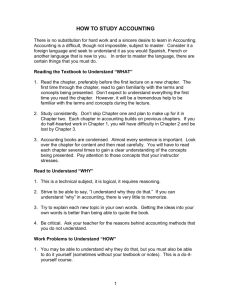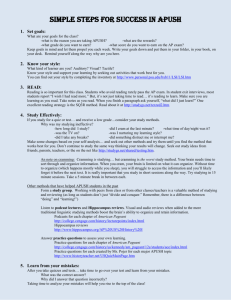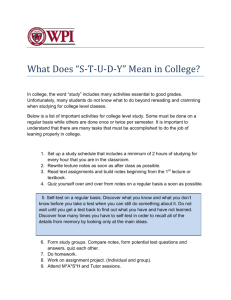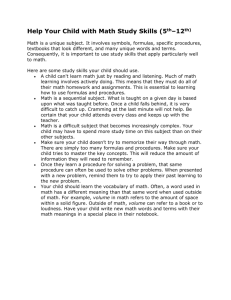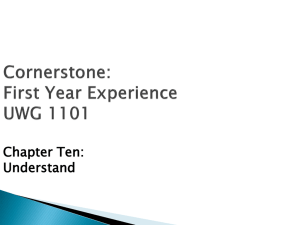How to Cram . . . . (even though you shouldn
advertisement
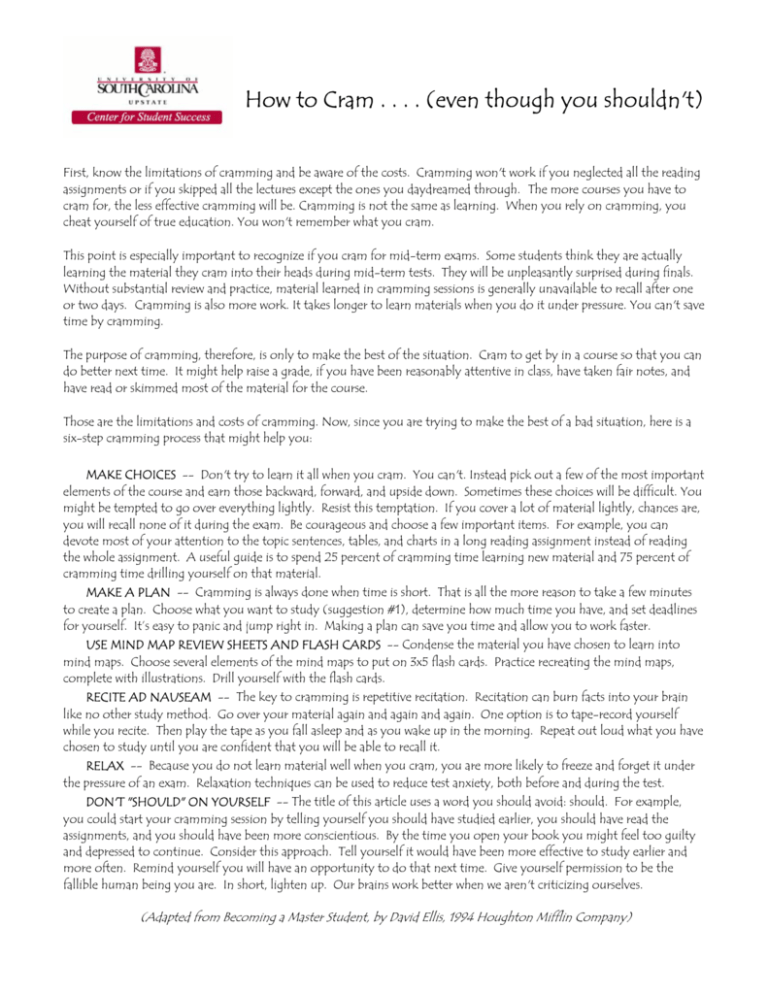
How to Cram . . . . (even though you shouldn't) First, know the limitations of cramming and be aware of the costs. Cramming won't work if you neglected all the reading assignments or if you skipped all the lectures except the ones you daydreamed through. The more courses you have to cram for, the less effective cramming will be. Cramming is not the same as learning. When you rely on cramming, you cheat yourself of true education. You won't remember what you cram. This point is especially important to recognize if you cram for mid-term exams. Some students think they are actually learning the material they cram into their heads during mid-term tests. They will be unpleasantly surprised during finals. Without substantial review and practice, material learned in cramming sessions is generally unavailable to recall after one or two days. Cramming is also more work. It takes longer to learn materials when you do it under pressure. You can't save time by cramming. The purpose of cramming, therefore, is only to make the best of the situation. Cram to get by in a course so that you can do better next time. It might help raise a grade, if you have been reasonably attentive in class, have taken fair notes, and have read or skimmed most of the material for the course. Those are the limitations and costs of cramming. Now, since you are trying to make the best of a bad situation, here is a six-step cramming process that might help you: MAKE CHOICES -- Don't try to learn it all when you cram. You can't. Instead pick out a few of the most important elements of the course and earn those backward, forward, and upside down. Sometimes these choices will be difficult. You might be tempted to go over everything lightly. Resist this temptation. If you cover a lot of material lightly, chances are, you will recall none of it during the exam. Be courageous and choose a few important items. For example, you can devote most of your attention to the topic sentences, tables, and charts in a long reading assignment instead of reading the whole assignment. A useful guide is to spend 25 percent of cramming time learning new material and 75 percent of cramming time drilling yourself on that material. MAKE A PLAN -- Cramming is always done when time is short. That is all the more reason to take a few minutes to create a plan. Choose what you want to study (suggestion #1), determine how much time you have, and set deadlines for yourself. It’s easy to panic and jump right in. Making a plan can save you time and allow you to work faster. USE MIND MAP REVIEW SHEETS AND FLASH CARDS -- Condense the material you have chosen to learn into mind maps. Choose several elements of the mind maps to put on 3x5 flash cards. Practice recreating the mind maps, complete with illustrations. Drill yourself with the flash cards. RECITE AD NAUSEAM -- The key to cramming is repetitive recitation. Recitation can burn facts into your brain like no other study method. Go over your material again and again and again. One option is to tape-record yourself while you recite. Then play the tape as you fall asleep and as you wake up in the morning. Repeat out loud what you have chosen to study until you are confident that you will be able to recall it. RELAX -- Because you do not learn material well when you cram, you are more likely to freeze and forget it under the pressure of an exam. Relaxation techniques can be used to reduce test anxiety, both before and during the test. DON'T "SHOULD" ON YOURSELF -- The title of this article uses a word you should avoid: should. For example, you could start your cramming session by telling yourself you should have studied earlier, you should have read the assignments, and you should have been more conscientious. By the time you open your book you might feel too guilty and depressed to continue. Consider this approach. Tell yourself it would have been more effective to study earlier and more often. Remind yourself you will have an opportunity to do that next time. Give yourself permission to be the fallible human being you are. In short, lighten up. Our brains work better when we aren't criticizing ourselves. (Adapted from Becoming a Master Student, by David Ellis, 1994 Houghton Mifflin Company)

